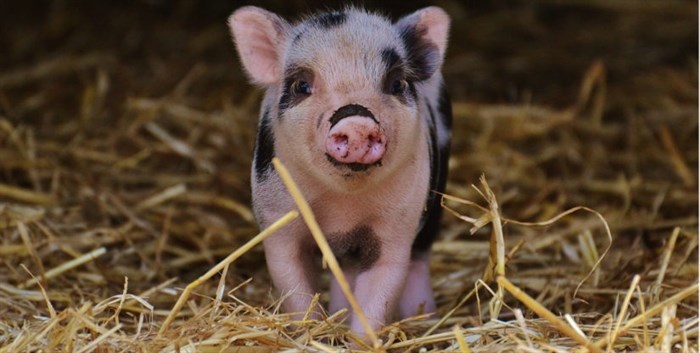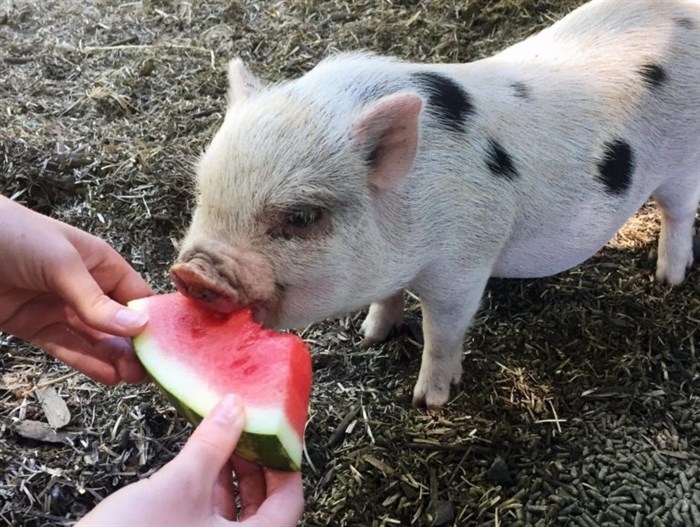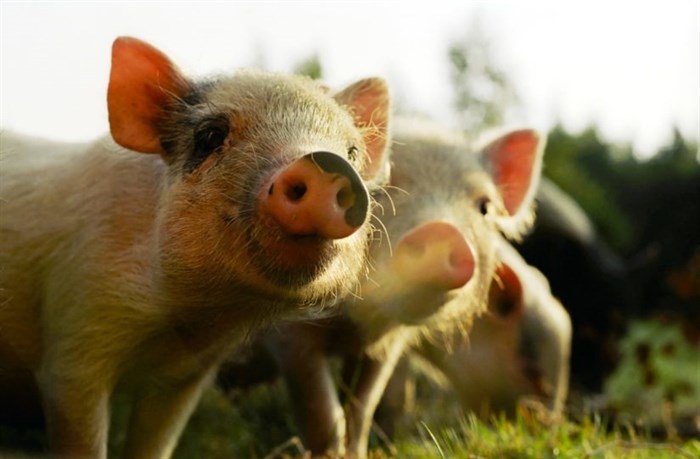
Image Credit: BC SPCA
May 09, 2020 - 1:00 PM
Mini pigs have experienced a surge in popularity over the past few years. But are mini pigs real?
“Mini pig” is a term used to encompass any smaller breed of pig, and is often substituted with other terms like “micro-pigs,” “pocket pigs,” and “teacup pigs.” They are not a distinct breed, but can be a variety of breeds and mixes of breeds that have been selectively bred to be smaller in size, according to the BC SPCA in a news release.
Meghann Cant, manager of Companion Animal Welfare Science and Policy for the BC SPCA, understands the appeal. “There is no denying how cute they are. Pigs are intelligent, curious and affectionate animals,” she said in the release. However, Cant warns against mistaking them for easy-to-care-for house pets.
Wondering if mini pigs are good pets? If you are considering a pet mini pig, here are a few things to consider:
1. Is it legal?
Keeping farm animals within city limits is against the law in many municipalities. Many people get a mini pig only to later realize it’s not allowed in their city. These people are then faced with a choice: move or find a new home for their pig.
“Pigs are not easy to place,” Cant said in the news release. “People soon discover that hobby farms and rescue groups have little or no capacity to take on more pigs.” Zoning restrictions is one of the main reasons why pet pigs end up in search of a new home.
2. How big do mini pigs get? Are there any pigs that stay small?
Another common reason pet pigs are surrendered is because they grew larger than expected. “Words like ‘micro’ and ‘teacup’ are misleading,” Cant says. Many pigs sold as pets are young, even newborn, and have yet to reach their full size and weight, which can be substantial. “Not many homes can accommodate a pet that size,” she said in the news release.
Be sure to ask the age of the parents if the breeder shows you pictures, or better yet, ask to meet the parent pigs. “Sometimes breeders show people how small the parent pigs are when the parent pigs are not yet full grown themselves,” Cant said in the release. By three to six years of age, pigs are fully grown. Any younger, and they probably won’t be.
There are many breed of pigs sold as “mini pigs,” including the Kunekune, Juliana and Pot-bellied pig. However, even the smallest breeds of pigs will not remain very small. According to the American Mini Pig Association, a standard mini pig can range from 35 – 50 cm tall and can weigh between 50 – 150 pounds full grown.
If your “teacup” pig is actually a standard farm-breed pig, it will grow even heavier and up to three times as tall. Mature females can reach more than 700 pounds and males even larger: possibly more than 1,000 pounds. “Be aware that whatever you adopt, it will never fit inside a teacup,” Cant said in the release.
READ MORE: Vernon man who let his dogs 'hunt for food' loses appeal to get them back
3. What type of housing do pigs require?
Think pigs are easy to care for? Check out the Code of Practice for the Care and Handling of Pigs. This 70-page book only covers the minimum requirements for caring for pigs.
Some aspects of the urban environment are not compatible with keeping pet pigs. “People often expect owning a pet pig to be similar to that of owning a dog,” said Leiki Salumets, Manager of Equine and Farm Animal Care for the BC SPCA, in the news release. While, in some ways, pigs are similar to dogs – they can be house-trained, for instance – they have other needs that are difficult to meet in a home setting.
“Pigs are very curious animals, and enjoy an environment where they can explore, root around with their snouts and manipulate objects. Some dog toys are not an appropriate choice for pigs, as pigs can often easily destroy and consume them, which poses a risk to their health. Other objects in your home may be the target of their curiosities as well,” Salumets said in the release. Suitable pig toys include anything that can be manipulated but not easily destructible, safe if consumed, and provides a challenge or results in a reward (e.g. a food treat) when the pig plays with it.
Without opportunities to perform normal pig behaviours, pigs will become bored and create their own fun in the house, often by rooting through cupboards, tearing apart couches and knocking over tables. Pigs are best suited to an outdoor environment that provides them with lots of space to carry out these activities safely.
Outdoors, you will need to provide them with shelter, as pigs are susceptible to cold and hot temperature extremes. Many people are unaware that pigs don’t sweat, they are prone to insect bites and parasites and they can get sunburnt. A wallow (i.e. a shallow mud pit) is very beneficial. It cools them off on hot days, and acts as an insect repellent, sun screen and skin conditioner, as pigs are prone to dry, flaky skin, according to the news release.
Appropriate fencing must be used to enclose their outdoor area, as pigs are very strong and can uproot it, push it over and even dig underneath it if not properly secured. You will also need to consider protecting your pig from predators like coyotes, wolves, big cats, bears, or even loose dogs.

Image Credit: BC SPCA
4. Are pigs compatible with other pets?
As with any pet, pigs may or may not get along with other animals in the household. In general, pigs and cats tend to live peacefully together. Dogs and pigs, on the other hand, are an unpredictable combination, mainly because dogs are a large predator species and pigs are naturally a prey species. This may lead to unwanted bullying of your pet pig.
“Dogs have been known to attack pigs – even ones they have lived with for a while,” Cant said in the news release. “Pigs can also behave aggressively towards dogs, especially when food is involved.” Interactions between the two should always be supervised.
Though pigs may not get along with other pets, Cant notes that they are very social animals and should be housed with other pigs.
5. Pig nutrition
Pigs are omnivores and need a balance of vitamins, minerals, proteins, fiber and carbohydrates. “Mini pig” feed can be purchased at feed stores, but it is not always easy to find, and the feed that pet pigs require is different from that of farm pigs.
Pigs can eat some human food scraps and leftovers, such as vegetables and fruits (as long as they are not spoiled). However, feeding your pig only human food is not ideal as it is not guaranteed to meet all of their nutritional needs; it is important they still receive pig feed to ensure their nutritional requirements are being met.
Pigs should always have access to water, and should be fed at least two or three times per day. Pot-bellied pigs consume a few pounds of food per day, but if your teacup pig turns out to be a farm-breed pig, you can expect it to consume as much as four to seven pounds of food per day.
Information on the internet can be very incorrect in regards to feeding pigs. “Some websites state that feeding pigs a reduced amount of food each day will keep it small. But this may result in an underweight pig with developmental and health issues, as the genetics of the pig dictate its skeletal size, not the amount you feed it. If one were to feed their pig such a small amount of food, they would be starving it, resulting in many potential negative implications on its health, including malformed bones, poor hair coat, inadequate brain development and even death. Each pig should be fed a diet specific to its individual needs to ensure adequate health and body condition,” Salumets said in the release.
6. Do you have access to suitable veterinary care in your community?
Pigs may live for up to 15 years. During that time you will need to plan for vet visits just like you would with other pets. Pigs require vaccinations and are susceptible to a number of illnesses that humans also get, such as the flu. It is very unlikely a pet clinic will accept pigs. You’ll need to find a vet who works with pigs. Tusk trims may also be required, according to the news release.
Because they are prey animals, sometimes pigs try to hide the fact that they are sick or injured.
7. Should you get a pet pig spayed or neutered?
Mature, intact boars (i.e. male pigs) grow very large and can be aggressive. Therefore, male pigs should be neutered (castrated) as early as possible while they are young. The procedure should only be done by an experienced veterinarian using pain medication. Spaying female pigs is not very common, so you may find it difficult to locate a vet who is willing to perform the procedure.
Depending on the breed, pigs may become sexually mature as early as three to four months of age. If you adopt a male and female together, you will need to neuter your male. Pigs can have litters of up to 14 piglets at a time. While 14 piglets sounds like cuteness overload at first, you will quickly be overwhelmed.
8. How do you transport a pig?
Pigs, like humans, are susceptible to motion sickness and may become nauseous in a moving vehicle.
Remember, at minimum, you must abide by the Canadian Code of Practice for the Care and Handling of Farm Animals: Transportation. Transporting a pig in the trunk of a car or the back of a pickup truck would be unsafe, as would allowing the pig to move about freely inside a moving vehicle.

Image Credit: BC SPCA
9. How do you train a pig?
Pigs can be taught like any other animal, in things such as house training, using positive reinforcement. Food rewards go a long way with pigs! However, unlike puppy classes for dogs, there are not a lot of options for pig training classes. This means you will need to be comfortable training your pig on your own. “Pigs are very intelligent animals, and owners must have experience with pigs and a good understanding of pig behaviour, learning theory and humane training methods in order to successfully house train them,” said Salumets in the release. It is also important to realize that pig ‘accidents’ on the floor are much larger, messier and smellier than dogs.
10. Do pet pigs smell?
While pigs are clean animals and typically do not have a body odour, it’s important to know that pig manure is very smelly. Most people say it smells worse than horse or cow manure. In other words, expect a few complaints from the next door neighbours. Pigs can also be very vocal – another thing that won’t make you very popular if you live close to your neighbours.
READ MORE: Pandemic causing 'unprecedented' threat to beef and pork producers: industry
11. How much does a mini pig cost?
-
Adopting your pet: generally around $250 (breeders may charge up to $3,000)
-
Licensing, if required
-
Veterinary bills, such as:
-
Vaccinations
-
Parasite treatments
-
Treatments for injuries, illnesses and check-ups
-
Tusk or hoof trims, if needed
-
Spay/neuter
-
Food costs, including vitamins, if needed
-
Housing, fencing and bedding costs
-
Cost of care while you are away on vacation
-
Costs of replacing valuables should they get destroyed by your pig
12. What happens to unwanted pigs?
In the end, like so many fad pets before them, it is the pigs who pay the price for their popularity. Well-intentioned but poorly-informed caregivers become overwhelmed and, as a result, many pet pigs are relinquished to shelters, rescues and hobby farms. However, pet pigs can be very hard to re-home, as these groups often have little or no capacity to take in unwanted pigs. You may be left facing euthanasia by a vet, according to the SPCA.
“Releasing pigs into the wild is illegal and inhumane, as pigs used to living as a pet have no experience in the wild,” Salumets said in the release. “If the pig does manage to survive and reproduce, the surrounding environment could be negatively impacted.”
“We need to learn from the past,” Cant said in the release. “Other animals, such as turtles and hedgehogs, have had their 15 minutes of fame in the pet trade too. Many are no longer popular because people have realized they are just not suitable as pets. Sadly, though, the realization often comes only after the animals have suffered.”
For more information on this issue, you can email the BC SPCA.
To contact a reporter for this story, email Carli Berry or call 250-864-7494 or email the editor. You can also submit photos, videos or news tips to the newsroom and be entered to win a monthly prize draw.
We welcome your comments and opinions on our stories but play nice. We won't censor or delete comments unless they contain off-topic statements or links, unnecessary vulgarity, false facts, spam or obviously fake profiles. If you have any concerns about what you see in comments, email the editor in the link above.
News from © iNFOnews, 2020